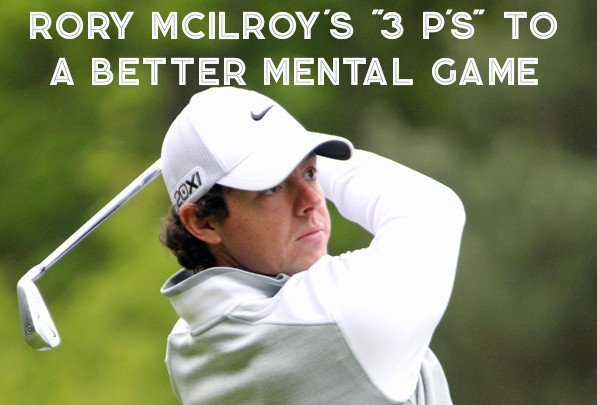
During the past few years, Rory McIlroy has been quite candid about sharing some of the work he’s been doing to improve his mind-set and mental game. Without a major win in almost 7 years, the pressure has mounted on Rory who (after becoming one of only three players to win 4 majors by the age of 25) was tipped to become one the greats. With Majors being the measure of success for most professional golfers (and what makes “great” players great), each year that passes without a major has placed more and more pressure on Rory to win one and live up to his own (and others) expectations for his career.
Feeling the Weight of Expectation
I’m sure you know what it’s like to feel the weight of expectation – you know how good you are and what you are capable of and hence you put expectations on yourself for how you should play. Or perhaps someone else is creating expectations for you?
What do expectations do?
- Expectations can damage confidence
- Expectations make it harder to recover from mistakes and poor rounds
- Expectations can make you be judgmental and critical of yourself
- Expectations are often unrealistic and set a player up for failure
High expectations are not the same as having high confidence. High confidence is believing that you are capable of winning, but not expecting it to happen.
How Rory Is Playing With More Freedom
Rory recently spoke about a new mental approach he’s taking to play with more freedom (from expectations), which he simplifies by calling it his “Three P’s”.
Perspective
Good scores are more likely to occur when you don’t expect to get them. Rory knows that in the past he “pushed too hard” to win (especially in the majors), which didn’t allow for freedom in this game. Jordan Spieth is another player to get off to a great start in this career and then the weight of expectations negatively impacted his performance.
Rory had to change his perspective of what success is. He still believes he can win every tournament he plays in, but there’s more self-compassion and a better way to judge his rounds. By creating mini (or “process”) goals that are within his control, he has something to focus on in the present moment, instead of focusing on whether he’s going to win or lose. If he’s able to achieve his mini goals, he gives himself the best chance of a good outcome – it’s that simple. So no matter what the result at the end he can he happy with himself (in the past he was only happy if he won).
He also has a new perspective on how he treats each tournament. Instead of building up the pressure on himself to play well at the “big” tournaments, he tries to treat every tournament the same. He said before The Masters:
“Honestly, I try to treat every tournament the same. It’s 72 holes, 18 holes a day. It is no different than any other golf tournament we’ve played. This is a life-long journey of trying to improve and learn and master my craft, it’s not about how I play in one tournament.”
Try this yourself – find a new measure of success for your rounds that doesn’t include the end result and treat every round with the same level of preparation and focus.
Persistence
“You have to persist. Persist, persist, persist, until it turns around for you.” – Rory McIlroy
The great players are persistent. But what is persistence? Persistence is being able to keep the same level of effort, focus and determination regardless of what the shot is for, how well you are playing or where you stand. The greats could also be described as “optimistic”, which is similar to persistence – they believe that setbacks are temporary and things will turn around at any moment. A lot of golfers can be pessimistic and lack persistence. I hear it all the time from golfers – they were having a poor round and they gave up. Having persistence and “staying in the fight,” until that last putt goes in on the 18th green is a skill in itself and every round you play you have an opportunity to train it (the times you aren’t playing well is an even better time to train it as you have to dig deeper). This is a “success factor” that I will have my students measure the success of their rounds by (as part of their Mental Game Scorecard).
Poise
Rory’s new mental approach includes working on being more composed and ruthless, like his counter-part Brooks Koepka. Rory said after his win at the Tour Championship in 2019 that he wants to be “more like Brooks” and he tries to emulate him.
This is a great compliment to Brooks Koepka, who certainly looks stoic and composed under the highest pressure. He also doesn’t seem to let anything bother him. It’s not a coincidence that Rory’s reading list includes books such as “The Obstacle is the Way” and “Ego is the enemy” by Ryan Holiday, both inspired by the Greek school of Stoicism which teaches that challenges should be faced with more composure and less emotion.
Rory says gets himself into his winner’s mindset with a pre-round routine including meditation for 20 minutes and visualization exercises. I’m guessing that he visualizes himself as the player he wants to be out on the course (the characteristics) – playing with confidence while being able to deal with anything that’s thrown at him.
Thanks for reading. I’m hoping that hearing about the some of the mental techniques that the best players in the world are working on, will help motivate you to begin work on your mental game. Developing your mental skills (such as the “3 P’s”) and playing with more freedom is what the Golf State of Mind philosophy and training system is all about.


